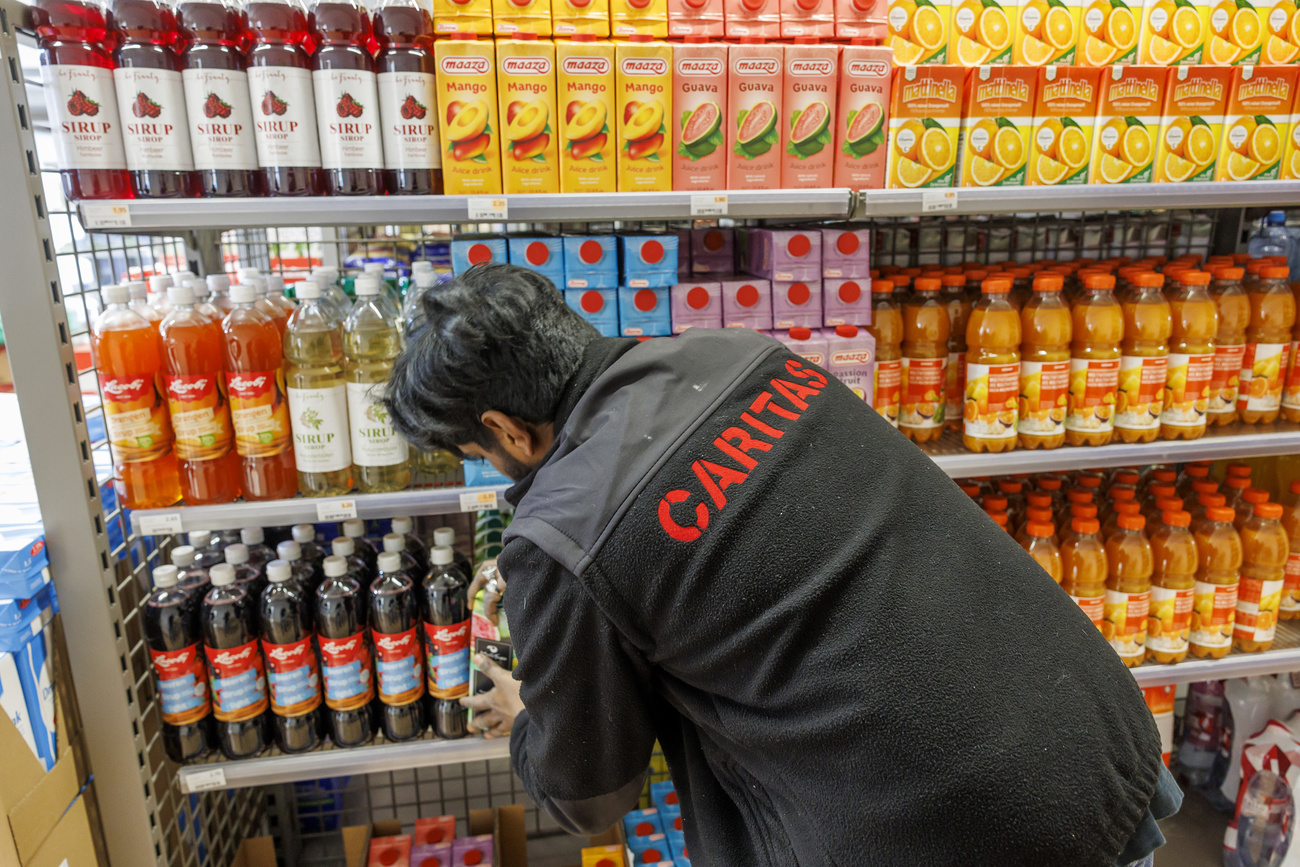
Minimum wage: Swiss cantons push on despite national setback

Vaud is set to become the latest Swiss canton to vote on a minimum wage after campaigners handed in signatures for a CHF23 ($25) hourly rate. However, a pending national law could nullify much of its impact.
On Tuesday campaigners in Lausanne handed in 32,000 signatures for two separate but mutually dependent initiatives: one to anchor the principle of a minimum wage in the cantonal constitution, and one dealing with a law to implement it.
The initiators – trade unions and left-wing parties – said the idea was “timely”, as inflation, healthcare costs and rent prices squeeze low-earners. They want authorities to process the initiatives quickly and bring them to ballot.
A decade after Swiss voters roundly rejected a national minimum wage of CHF22 – which would have been comfortably the world’s highest – Vaud is the latest example of how the issue has shifted to the cantonal and local level.
In recent years five of the 26 Swiss cantons have voted in favour of a minimum wage: Neuchâtel in 2017 (CHF20.77), Jura in 2018 (CHF20.60), Geneva in 2020 (CHF23), Ticino in 2021 (CHF19) and Basel City this year (CHF21); some of the rates have since been adjusted upwards due to inflation. Initiatives are also underway in several other cantons, while in June Zurich and Winterthur became the first cities to follow suit with a minimum rate of CHF23.90 and CHF23 respectively.

More
Zurich to pay minimum wage of almost CHF24 per hour
Pushback
However, the flurry of local activity is facing legal and political resistance. The Zurich and Winterthur laws, for example, are currently blocked by legal appeals filed by employers’ groups. If every municipality were to bring in its own minimum wage, it would lead to absurd situations, Zurich employers’ spokeswoman Nicole Barandun told Swiss public radio, SRF,External link last month. Her group wants clarification on the legality of the text.
Whether it is successful or not remains to be seen. In 2017, the federal court ruled that minimum wages at the cantonal level were constitutional. But such action at the municipal level is new. In the meantime, Zurich and Winterthur authorities are moving ahead with preparations to introduce the legislation, SRF writes.
Another challenge is brewing in Bern, where last December parliament approved a motion to give precedence to collective bargaining agreements over local minimum wages.
The text by Centre Party politician Erich Ettlin proposes that in sectors where a national collective wage agreement has been negotiated, this would apply regardless of a cantonal minimum rate – even if the negotiated wages were lower. While this stipulation is already built into the laws of three cantons, it would have an impact on the minimum wages in Neuchâtel and Geneva – in the latter, the UNIA trade union estimatesExternal link it would result in a CHF1,000 monthly drop in income for hairdressers, for example.
This idea is currently with the Swiss government, which will draft a law and send it back to parliament. Left-wing groups say they will keep fighting it, including by gathering signatures for another national referendum.

More
One in 20 in Switzerland is ‘materially and socially deprived’
Swiss speciality
Internationally, the debates might seem like minor details in a country where salaries are in any case high (see box below).
Domestically, however, the debates are symbolic of how political parties operate in the highly federal Swiss political system, by focusing efforts at the national or local level depending on the issue.
The minimum wage topic – like other issues such as paternity leave or rights for illegal immigrants – is an example of how cities can introduce “left-wing ideas which have no chance nationally”, the NZZ am Sonntag newspaper wrote in JuneExternal link.
A minimum wage of CHF23 per hour, or CHF4,186 for a 42-hour week, is indeed high by international comparison. The next highest in Europe is Luxembourg’s €2,508 (CHF2,414). In Germany, the minimum wage is €12 per hour. However, costs and wages are generally high in Switzerland, where the median gross monthly salary is CHF6,665.
That said, in 2021 around 745,000 people (of a population of almost nine million) lived on an income below the poverty line – defined as an average of CHF2,289 per month for a single person and CHF3,989 per month for two adults and two children.
The trend is part of a “political shift” in recent years which has seen urban areas become more left-wing and rural areas remain conservative, the paper wrote. Left-wing parties are aware of this, and have been successfully using it to their advantage.
As for the political right – generally a staunch supporter of decentralisation – it can find itself taking the opposite tack by fighting for more national power, such as on the wage issue.
Justifying its support of Ettlin’s motion last December, right-wing parliamentarians said it would “reinforce the social partnership, which has guaranteed peaceful labour relations in Switzerland for over 100 years”.
Likewise, the right is often a vocal supporter of direct democracy. In this case, however, it argues that cantonal votes on minimum wages could endanger the historic balance between employers and employees.
“There is a democratic decision on the one hand and a rule of law on the other; you can’t vote on everything,” Zurich employers’ spokeswoman Barandun told SRF.
Race to the ballot
In the case of Vaud, campaigners have not been put off by events in Bern. In fact, the text handed in on Tuesday explicitly states the opposite of Ettlin’s idea, by giving the proposed CHF23 wage precedence over collective agreements.
“The minimum wage is a tool of social policy” to enable workers to live “in dignity”, the campaigners write on their websiteExternal link. Other aspects of collective agreements such as training, holiday rights and career progression provisions will remain valid.
As for Ettlin’s motion, the campaigners say it not only raises “major institutional problems”, but that the process of validating it could take years – canton Vaud should meanwhile have the right to “make a sovereign decision on the issue”.
That said, it could also take some time before citizens in Vaud get to decide: the campaigners told the Le Temps newspaperExternal link they don’t expect a vote before 2025 at the earliest.

In compliance with the JTI standards
More: SWI swissinfo.ch certified by the Journalism Trust Initiative































You can find an overview of ongoing debates with our journalists here . Please join us!
If you want to start a conversation about a topic raised in this article or want to report factual errors, email us at english@swissinfo.ch.